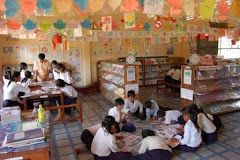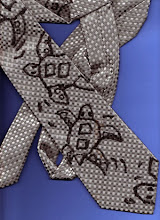Hi Friends. I see many of you popping up here on Friday evenings eagerly looking for the new interviews. Thanks for that! Alas, as you may have noticed, the "Each One Teach One" Author interviews are now posted by Saturday morning, not Friday night. Friday nights were a bit tricky in my busy work week. So, the new interviews will always be up here by Saturday morning! Come on by then to read them! Thanks!
This week's Awesome Author Interviewee is my good friend, Kathleen (Kate) Reilly, (photographed above, while on a camping trip with her husband and kids. :)!) Kate's a non-fiction book, magazine, and MG fiction book writer. She's one of those select few authors who decided one day that she was going to write full-time, for a living, and she has been a great success story in doing what she loves (writing) while pulling in a living wage as an author ever since.
Kate was a huge help to me when I first started writing non-fiction for magazines. She taught me the basic in's and out's of the trade, and I will always be grateful for her guidance. Kate's written 10 books, seven of them non-fiction, including two of my favorites, PLANET EARTH (A book that teaches kids about the earth through hands on learning, science experiments, and fun,) and WALT DISNEY WORLD EXTREME VACATION GUIDE FOR KIDS (a book that does that same thing for Disney world that PLANET EARTH did for the planet : ) -- I'm sure most parents out there don't know half of the wierd science, fun experiments, awesome craft and fundraising ideas, and historical facts that make this book a great resource for any kids and parents planning a Disney Vacation in the next 6-8 months. I know when I reviewed it, I certainly learned a lot! Kate also writes non-fiction for various national magazines, and her first middle grade novel, a hilarious (yes, I've read the manuscript,) tale for middle graders is currently in the hands of her agent and making it's rounds to publishers.
So, welcome, Kate! You've helped many others learn the craft already. But who was the author who "reached back" to help you when you were first starting out?
I’d been freelancing for only a year or so when I realized I needed to be part of a larger community of writers. I’d known writer Vicky Mlyniec in passing from a small, quirky online writing group, and I’d heard her talk about a group of professional freelancers she belonged to, Freelance Success (FLX). I asked Vicky about it, and she encouraged me to consider joining. I did, and it was the best decision of my writing career. I’ve met more good friends than I can count, and the advice and camaraderie have been phenomenal.
Vicky continued to be a quiet-spoken but steady friend throughout my early writing years. She was always one of the first to respond to my questions on FLX, always offering simple words of advice or support, always passing along information I could use.
She was never a flashy, outspoken, or in-your-face kind of writer…she never took anything for granted or flaunted her success. My lesson from Vicky is that you can blend the art of writing with the craft of writing, and do it without theatrics or leaching off anyone else. You don’t have to step on anyone else to reach your goal; you don’t have to wear a big sign that says, “Look at me!” You just learn what you can, apply it honestly to your work, and stay the course when things get rough.
That sounds like great wisdom that you learned from Vicky Mlyniec! She obviously not only linked you with a great network of other writing professionals, but also led by example with her quiet know-how and steady work ethic. Thanks for mentioning her!
You obviously have successful relationships now with a number of very diverse editors who you have worked with over the years and continue to write for today. Would you say that implementing Vicky's wisdom that theatrics or 'look at me' fanfare are not needed has helped your career?
Oh yes. I think editors and agents appreciate working with someone who is down-to-earth and not needy or constantly in need of ego-stroking. Publishing is a funny industry because you’re combining the touchy-feely art of writing with the cold reality of business. You’ve got to find a balance if you want your work to be shown and shine. Pour your heart and soul onto the page, but then pull on your working boots and handle the business side of things with professionalism. I guess it’s like finding the balance between your inner child and outer adult.
That's great advice, Kate. I know I've heard from many editors at conferences that they much prefer calm, rational writer/artists to those who need a lot of extra emotional stroking to stay happy and productive. Writing is an art form but publishing is a business, as well. Well said.
I've already mentioned how you helped me start my own free-lance magazine work, a number of years ago, Kate. How else have you reached out to help other writers, now that you've found your own success in the biz?
I’m still part of the FLX community, and I’ve fielded emails from strangers who have contactedme to ask for my suggestions on getting started. And of course, as part of the fabulous Goalies writing group locally, we’ve been able to reach out to other up-and-coming writers in our local community. I’m always happy to talk with anyone who has questions about the business or the craft – although I still feel like I’m in a constant state of growth and learning, too, so we’re kind of learning together.
It is only the wise, Kate, who have learned enough to concede that they are still learning new things all the time. Thanks for reaching out to help the rest of us learn new things too!
We know you're not new to this business. But how old were you when you first started writing? And was it fiction or non-fiction (since now you do so well at both)?
I guess this is another story of someone reaching out to help me. I started writing when I was five (“The Rabbet and Dog and Cat”), but when I was in third grade, I got my first real assist. My teacher, Mrs. Jane Bull, set up a special desk for me and stuffed it with paper and writing prompts. If I finished my work early, I could go sit at that desk and create my masterpieces. She even entered one of my stories in the high school competition, where it tied with two others for first place. (I still have a copy of that five-dollar check she brought over to my house and presented to me with the most proud, broad smile I’ve ever seen.)
Ah, what a great story! And I love that you still have the original copy of that story and have so sweetly posted it on your website with all of your later published works. That's great! And hooray for Mrs. Bull for seeing your passion and talent for writing early on and going the extra mile to encourage and affirm you. I suspect that almost every author today can point back to a teacher who somewhere along the way affirmed their writing and thus gave them the courage to press forward in this craft. For me it was Mrs. Tetor, in 8th grade English. : ) Thanks Mrs. Tetor and Mrs. Bull! For those out there reading this, who was it for you?
So Kate, tell us about a recent project you've been working on that has your passion all fired up?
Since I write for a living, there’s a pressure to PRODUCE. Sometimes, that pressure completely blocks me, because I can’t see the art—the business bully is standing in the way. Instead of pounding my head against the keyboard (tried it; doesn’t work), I step away from the computer. I’ll either do some writing by hand (you know, pen and paper? ’member those?), read, or leave the office completely to seek inspiration. Actually, that’s not entirely accurate. I don’t look for ANYTHING. I just let go of whatever I’m trying to think of, and do something like scrub the bathroom or walk on the treadmill (I call it my “brainstorming machine”). Lately, I’ve been building a Rube Goldberg machine with my kids (video to come; watch for it!). That’s helped loosen the ideas by doing something creative other than words
I think that's a brilliant strategy, focusing on something other than writing sometimes, to help get those creative juices flowing! Also, what a wonderful example that is of doing something both fun and educational with your kids! (And for those who don't know this, Kate's sons helped her write and illustrate her Walt Disney World Extreme Vacation Guide book -- another way-cooler-than-normal mother son project. Kate is famous for these - though, being a non-flashy, quiet, calm, soft-spoken author and mom, she would never tell you. So I'm blowing her cover!)
Alright Kate, here's a fun question, who was your favorite author when you were a child?
My fourth-grade teacher gave me the Phantom Tollbooth, and I still have that copy (although it’s in a plastic baggie because the spine broke long ago and it’s in sections). I absolutely loved Milo as a character. (For years I told people my middle initial stood for Milo…I can’t believe I just admitted that…while I’m confessing, I also had an imaginary dog named Oil. He was a Great Dane, so I walked around all day with my arm stuck up in the air, holding his “leash.” But I’m drifting from your question…) I also loved the setting of that book, and how cleverly he combined numbers and language into the setting and plot. Such a great book.
Yes it is - a great book! And somehow I have no problem at all picturing you walking around with with your imaginary Great Dane. Hee Hee.
So, one final question. Why do you think it's important for experienced authors or illustrators to reach out of reach back to teach and assist those who are newer to this profession?
It’s important because this path is so, so twisted and tough (unless, apparently, you’re writing erotic ebooks or helpless heroine tales). If someone with experience can answer some questions or hold out a helping hand to someone who’s starting out, it gives the newcomer hope and a small light to guide them to their next step. However: Those starting out have to realize there’s no magic pill – it’s still about learning and trying and a whole lotta butt glue to stay in your chair!
Ha Ha, Kate! And just when I was about to run off to write an erotic helpless heroine tale I realized that your last sentence means we still have to keep our butts in our chair and do the work, no matter what we're writing! Yes, that's definitely the hard part on many days. But you're another great example of how all the hard work is worth it in the end. Of course, the end of one book or project is really just the begining of another, for those of us, like you, who aspire to be full-time, successful writers!
Thanks for all your wisdom on how to keep our art and our business skills aligned with each other as we go quietly along in this profession! This has been a fun interview!
Next Saturday morning our author guest will be award-winning MG Historical Fiction Author Joyce Moyer Hostetter. See you all then!


.jpg)










